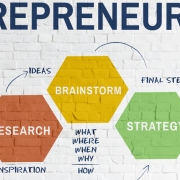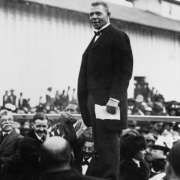Free market economics is a misunderstood phenomenon. As a dynamic system, it is complex and defies computer modeling. It is emergent, having both micro levels of individual human action and macro global trading systems. Accordingly, capitalism is not a contrived system. It is organic, and to understand it we must identify the essentials. In the case of capital markets as a vehicle for mass human flourishing, Poetic Justice Warrior John Bogle understood the economics, identified the essentials, and communicated their efficacy. Bogle’s Vanguard Group delivered the goods in a way that revolutionized an entire industry, and his innovative leadership improved the lives of countless millions. It’s what entrepreneurs do, as Bogle explains,
Rely on the virtues that intelligent human beings have relied on for centuries: common sense, thrift, realistic expectations, patience, and perseverance. In the long run, investing is not about markets at all. Investing is about enjoying the returns earned by businesses.
In 1803, the classical French economist Jean-Baptiste Say announced Say’s Law – production precedes markets and consumption. As the founding CEO of the Vanguard mutual fund business, Bogle highlighted the difference between entrepreneurs and markets, and announced that his clients will invest in businesses; markets are the natural manifestation of political freedom, which is essential.
Of Producers, Prices, and Profits
With this quote, Bogle declares the morality of profits through “enjoying the returns earned by businesses.” Not only is the pursuit of happiness our highest moral value, the pursuit of earned profit is a virtue; never at the expense of others, always through the delivery of value to others. As author, finance professor, and activist for capitalism Yaron Brook explains, along with Don Watkins in their book In Pursuit of Wealth, The Moral Case for Finance:
The profit motive is the producer’s motive. It is the desire to prosper, to spearhead the invention of new values that raise our standard of living. Each individual has to produce wealth in order to live and enjoy his own life.
Yet our postmodern culture scorns profits. Those who seek them are stigmatized as profiteers. In logic, there can be no contradictions, so what are the false premises behind this propaganda? Brook identifies three of them. First: “The motives of businessmen are fundamentally similar to the motives of criminals – material rewards for themselves. Second, the profit motive is dangerous and immoral – to be a manipulator or an exploiter. Third is to equate morality with selflessly serving society.”
Inevitably, those who preach self-sacrifice also proclaim that money is the root of all evil, but this absurdity is easily explained by journalist and satirist H. L. Mencken, “When somebody says its not about the money. It’s about the money.”
It should be about the money. As a unit of account, it’s why the Price Mechanism is essential to efficient markets, productive activity, and mass prosperity. As a medium of exchange, it’s how the most people are able to experience and voluntarily share their pursuit of happiness. As a store of value, it’s where John Bogle saw a marvelous opportunity for value creation – exploit the price mechanism of efficient capital markets for the benefit of small investors, and really exploit the highly regulated and expensive cost structure of an entrenched mutual fund industry that was ripe for innovation.
More, Better, Cheaper
And it’s about the savings. One attribute of human life is that our most productive years do not coincide with our consumption needs and desires. Accordingly, the heroes of finance have enriched our lives by their creation of financial instruments – cash, stocks, bonds, and derivatives, as a store of value, and of time, for our savings. Their businesses essentially monetize time, and individual ownership of it, by borrowing, lending and investing. This is life-changing, and like any industry, finance is subject to economist Joseph Schumpeter’s laws of Creative Destruction.
Capitalism is by nature a method of economic change. This evolutionary character of the capitalist process is due to the fact that economic life goes on in a social and natural environment. Change alters the data of economic action.
For Bogle, his first economic action was to organize the Vanguard Group as a mutual corporation in 1975. Because his fund’s shareholders ultimately owned the company, he was able to align the interests of his clients with their money. It was their savings, no one else’s. In 1976, he launched the first mass market stock index mutual fund (now known as the Vanguard S & P 500 Index Fund) to allow his investors to avoid the underperformance risk the industry conveniently ignores. And in 1977, Vanguard abandoned the traditional broker/dealer sales network in favor of a no-load, direct distribution system. After all, why pay management and distribution fees for the opportunity to underperform?
Perhaps Bogle’s most profound innovation is rooted in the microeconomics of entrepreneurs running businesses and the macroeconomics of governments looting entrepreneurs who run businesses. As Watkins writes in Finance Isn’t Free and Never Really Was, “Macro instability is the result of government control of money, credit, wages, and prices. Micro instability is the result of government restricting financial freedom and subverting market discipline.” Economist Ludwig von Mises understands the role of the entrepreneur for peaceful human progress best,
An entrepreneur cannot be trained. A man becomes and entrepreneur by seizing an opportunity and filling the gap. No special education is required for such a display of keen judgment, foresight, and energy.
Yet the passive minds of the entrenched investment management industry, particularly their economic and market soothsayers, are merely government trucklers. Their medieval shiny object is to predict the Keynesian macroeconomic growth metric we know as GDP. Their stock analyst counterparts have their own holy grail – find mispriced companies and publish buy recommendations. Combined, they claim to earn their management fees by generating alpha (outperform the market) based on their conviction that capital markets are inefficient. It’s their cherished “information premium.” Friedrich Hayek’s essay The Use of Knowledge in Society (the most widely read in the history of finance) would be a good place to start.
True ESG Investing – Ethical, Scientific, and Gainful
Government economic planners demean capitalism and promote econometric models in order to stay relevant. Similarly, the Vanguard Group is a threat to investment committees who deny the price mechanism of Modern Portfolio Theory in order to stay relevant. As poetic justice would have it, the investment management industry is adapting for the benefit of everyone. For example, the proliferation of exchange-traded index funds and empirically sound factor-based strategies means more choice, quality, and profits.
Of course, the massive success of indexing has attracted the regulation loving looters and the subjective moralists who want to transform capitalism. A 2016 New York Times Op-Ed, authored by government cronies, simply declares index funds a monopoly that distorts the price mechanism. Fortunately, Nobel laureates Gene Fama and Ken French, who expanded the Efficient Market Hypothesis, have ethically and scientifically debunked the call for more intrusive governance,
Despite the increased popularity of index-based approaches, the data continue to support the idea that markets are working. Annual trading volume continues to be in line with prior years, indicating that market participant transactions are still driving price discovery.
John Bogle passed away a year ago, but his legacy thrives. In addition to the quality of life he earned for himself, family, employees, and investors, Poetic Justice Warrior John Bogle has proven that his forebears, the most reviled members of society in human history – value-creating money changers and lenders – deserve respect, recognition, and redemption. This is also a stunning achievement.













